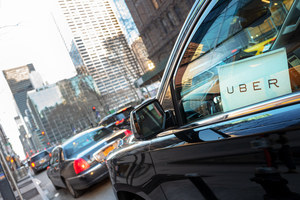 This question hangs in the air: Was the lawsuit worth it? Did the mountain labor and bring forth a mouse, and if so, why?
This question hangs in the air: Was the lawsuit worth it? Did the mountain labor and bring forth a mouse, and if so, why?$50,000 more than the last settlement offer
In the complaint, driver Martin Dulberg accused Uber of short changing drivers in violation of the terms of their contracts. He alleged that, while Uber charged passengers based on pre-ride estimate of time and distance, the company compensated drivers based on the actual distance they drove, which was sometimes less than the estimate. Uber pocketed the margin.
For drivers who were underpaid, the difference was often very small. But for Uber, which repeated this maneuver many times over, the difference could be substantial. This is the typical situation in which a class action lawsuit may benefit a large number of workers.
The settlement amount of $345,000 proposed in May would have paid many members of the class as little as a penny. For more than a quarter of the class members, the check would have been less than the cost of mailing it. Judge Alsup characterized it as ”dangerously inadequate”, and sent parties back to the negotiating table.
The revised proposed settlement amount guarantees a minimum payment of $20, without increasing payouts to those who would have received more than that amount under the initial settlement offer. The alternative would have been to exclude those who would have received miniscule payouts, thus permitting them to bring independent lawsuits against Uber.
Contract or California labor law?
The usual formulation advanced by labor and employment lawyers is that workers often do better when they are classified as employees rather than independent contractors. Employees have the protections of wage and hour laws, anti-discrimination laws and health and safety statutes, to name just a few. That is the background for many worker misclassification lawsuits, including much litigation against Uber.
It has also engaged the attention of the California State Assembly, which in May passed a bill that would make it harder for companies to label workers as independent contractors instead of employees. If approved by the state Senate, hundreds of thousands of independent contractors in California, including Uber and Amazon drivers, would likely have become statutory employees.
Contractors, on the other hand, have only the protections of their contracts. Where contracts are unique, individually negotiated, and especially if they include mandatory arbitration clauses, class action lawsuits become impossible. In Dulberg however, because a large class of drivers was covered by the same contract, class action litigation was plausible.
After two years of litigation, the result for many of the drivers was underwhelming. Because the case is being settled, it also has no precedential value for any similar class action contract lawsuit. Was it a fatal flaw to proceed under a contract theory, or was the lawsuit misconceived in some other way? Have Uber drivers and other contract workers gained anything?
Basic contract takeaways
At the very least, gig workers now realize that they may have a basis to proceed in a class action lawsuit when members of the class have signed on to the same or very similar contracts and the terms of that contract are violated.
It comes up with very large companies that make extensive use of contract workers rather than hiring employees – Uber, Amazon, Google, Nissan, and whatever company hires the janitorial workers who come in to clean offices at night. The practice is more prevalent than many people realize. According to an NPR/Marist poll conducted in 2018, contractors make up about 20 percent of the labor market. Where there is a breach of contract, there is the right to bring a lawsuit. Workers must police their contracts, however.
READ MORE CALIFORNIA LABOR LAW LEGAL NEWS
Misclassification wars continue
The second lesson is that the potential for recovery, at least in California, may be better when the lawsuit is framed in terms of misclassification.
Under the California Supreme Court’s 2018 decision in Dynamex Operations West, Inc. v. Superior Court, gig workers have a better chance of winning misclassification lawsuits, at least with respect to minimum wage and overtime pay issues.
Does Dulberg have lasting meaning for gig workers? Was it worth pursuing the lawsuit as a contract action? Perhaps not, but only time and further litigation will tell.
